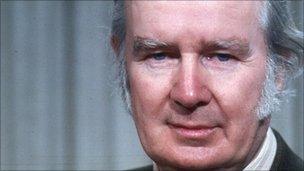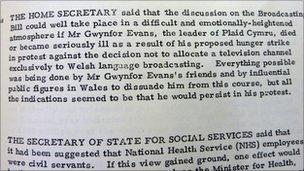New papers reveal hunger strike secret of S4C's birth
- Published

The papers reveal Gwynfor Evans's hunger strike drove a change in policy by the UK Government
Papers released under the 30-year rule reveal Gwynfor Evans's hunger strike was a key factor in the decision to set up S4C.
In 1980 the former Plaid Cymru MP for Carmarthen said he would fast to death if the government did not provide a Welsh-language TV service.
Newly-released cabinet minutes show the Thatcher government were concerned.
Both the Tories and Labour promised the channel if elected to government in the 1979 General Election.
In previously unseen documents, William Whitelaw said that changing the Conservative government's policy in favour of a Welsh-language channel would also "have the advantages of.... persuading Mr Gwynfor Evans, the leader of Plaid Cymru, to withdraw his threat to fast to death".
However, the then Secretary of State for Wales Nicholas Edwards stressed that he had made it clear to the press that "the change had been made in response not to violence but to moderate opinion following very wide consultations in Wales".

An extract from the cabinet minutes which have just been released
Shortly after the Conservatives won a majority in the election, the new home secretary Mr Whitelaw decided against a Welsh fourth channel, and suggested Welsh-language programmes be split between two existing channels.
Following pressure from Gwynfor Evans and other campaigners, Mr Whitelaw announced on 17 September 1980 that the government would set up a single channel, as originally proposed in their manifesto.
'Tension and unpleasantness'
Yet even after this announcement, documents show Mr Whitelaw told the cabinet "that he still thought that the previous plans were preferable".
Other files at the National Archive in Kew show that the Welsh secretary had raised concerns about the proposed hunger strike as early as June 1980.
Mr Edwards warned Margaret Thatcher's cabinet that there could be "much tension and unpleasantness in Wales later in the year, if he persisted in this intention".
He added that there was a "danger that Plaid Cymru would fall into the hands of extreme left-wing leaders".
According to further cabinet papers, the home secretary also cautioned that discussions on the Broadcasting Bill could take place in "a difficult and emotionally-heightened atmosphere if Mr Gwynfor Evans the leader of Plaid Cymru, died or became seriously ill as a result of his proposed hunger strike in protest against the decision not to allocate a television channel exclusively to Welsh-language broadcasting".
Yet he stressed that everything possible was being done by Mr Evans's friends and by influential public figures in Wales to dissuade him from this course.
These files are among a number of government records from 1980 which have been released for public viewing at the National Archives.
A selection are available to download for free until the end of January from the National Archives' website, external.
- Published6 November 2010
- Published29 October 2010